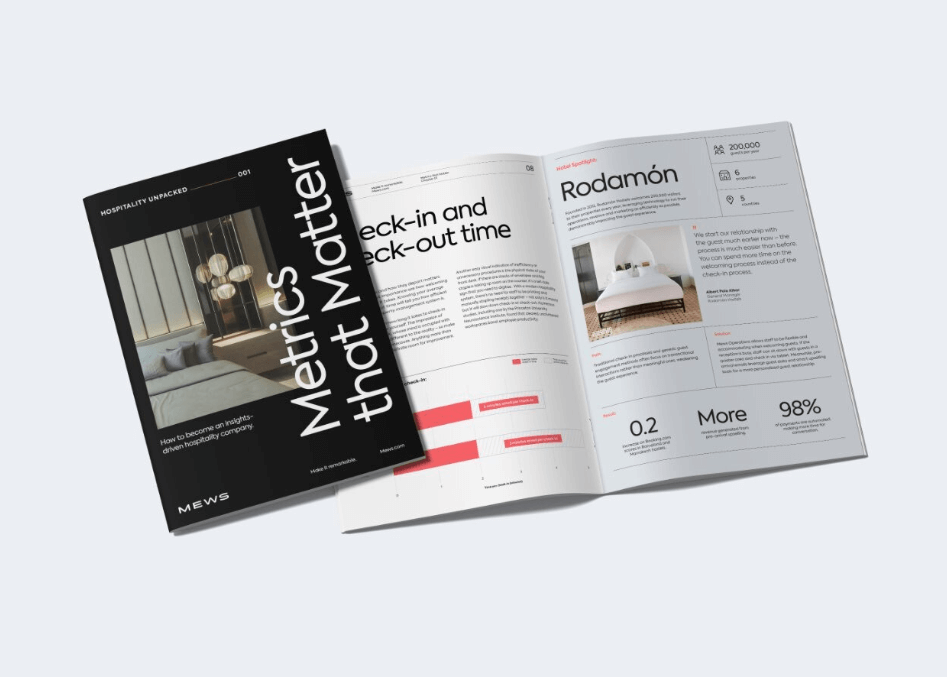Data-driven hospitality is all about embracing information that helps you make decisions that ensure your hotel's long-term success. By informing everything you do, data gives you a competitive advantage while challenging you to adapt.
Let's explore why data is crucial in the hospitality industry and how it can help position your hotel for sustainable success.
Table of contents
Why is data important in hospitality?
Data is relevant for hoteliers because it helps them stay competitive, enhance operational efficiency, and provide exceptional guest experiences. It gives you a clear overview of guest behaviors and preferences.
Data can also help optimize prices and offer better personalization based on guest profiles. Modern hoteliers plan and practice risk management based on predictive analytics.
Furthermore, data can enhance marketing strategies while improving guest satisfaction and loyalty. Understanding the figures behind your hotel's performance lets you maximize revenue and improve your bottom line.

The importance of making data-driven decisions in hospitality
Let's take a closer look at the importance of data-driven decisions. It starts with understanding customer preferences, determining effective pricing strategies, and unlocking operational efficiency. But it's also about staying flexible, better forecasting and managing risks while improving marketing efforts.
Understand customer preferences
Data helps you understand customer preferences, behavior and booking patterns. Catching these details lets you tailor services and marketing efforts to meet the needs of your hotel’s target audience. You can look at guest demographics to understand who your target audience is and what their expectations are.
A more targeted approach to marketing ensures more success in attracting new guests and engaging existing ones throughout the guest journey. Data also supports your personalization efforts – you can provide targeted recommendations to enhance your guest’s stay.
Determine effective pricing strategies
Finding the right price involves multiple factors. Setting competitive prices requires various data points – historical data from the previous year, competitor pricing and market demand. Want to unlock more revenue during peak periods and special events? Opt for dynamic prices based on demand and adjust them in real time.
The more your hotel can earn during busy times, the less you need to worry about generating off-peak revenue. This lets you focus on creating incremental revenue through upselling and increasing the average daily spend.
Unlock operational efficiency
Operational efficiency depends on correct staffing levels, good inventory management and well-organized housekeeping. Add data into the mix to unlock cost savings and better resource allocation. You suddenly know how many people you need at any given time or if you have the necessary inventory.
Improving housekeeping operations supports shorter waiting times between guests checking in and out. The best part is that you can store and optimize this data in a property management system. You can even analyze cleaning times and the most common mistakes. Similar data can also be used to improve front desk operations.

Improve adaptability
Hospitality is dependent on external factors like macroeconomics and microeconomics. Relying on data lets you better adapt to market changes. You can track spikes in demand, pricing of other hotels in your comp set, and other changes in customer behavior that may affect demand.
Practice forecasting
Forecasting and planning are also areas you can enhance by using data. Here are some examples: predictive analysis to properly allocate resources (especially in periods of high demand) and adjusting prices based on market trends. You can also predict future performance and consider what could ensure your property's success throughout the year.
Data can also be adjusted to forecast for each segment, showing you how to attract guests at any given time by adapting your marketing strategy.
Improve risk management
Risks include anything from negative feedback that impacts your hotel's reputation to fluctuations in demand. Leverage data to proactively minimize these risks.
It's imperative to collect data on customer satisfaction to identify areas for improvement, whether it's staff performance or faulty amenities. This proactive approach shows your guests you care about them.
Gain a competitive advantage
In an industry chockful of ambitious hoteliers, gaining a competitive edge can determine your hotel's success. To stand out from the rest, optimize your data collection and analysis, as well as revenue management strategies for pinpointing trends. Don't forget guest preferences and finding ways to improve operations.
Improve marketing effectiveness
Lean into data to inform and adjust your marketing campaigns. You can track important performance metrics like ROI and conversion and click-through rates. This will help you understand how to allocate your marketing budget and improve campaign effectiveness.
Tailored marketing efforts positively contribute to capturing leads and turning them into loyal clients. After all, the most expensive part of marketing is customer acquisition.
Conclusion
Data should lead your decisions and empower your choices with clarity. Embracing a data-driven approach allows your hotel to thrive, as informed decisions lead to better operations, happier guests and an improved bottom line.
Get started today by collecting and analyzing any data point mentioned in this article – you'll be surprised by the results.
Download our guide The metrics that matter


Author
Eva Lacalle
Eva has over a decade of international experience in marketing, communication, events and digital marketing. When she's not at work, she's probably surfing, dancing, or exploring the world.

Essential hotel technology for general managers
Download now
Hospitality hot takes straight to your inbox


.webp)